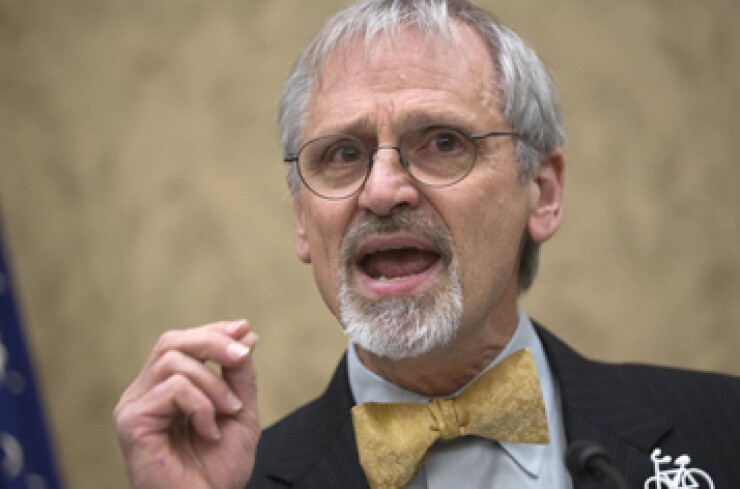
WASHINGTON - Congress should consider raising motor fuels taxes to shore up the dwindling Highway Trust Fund, a bipartisan grassroots group advocating responsible fiscal policy said this week.
"With fuel prices at their lowest levels since 2010 and continuing to fall, now would be an opportune time for policymakers to consider in increase in motor fuels taxes because consumers would not be as sensitive to it," the Concord Coalition wrote in a paper analyzing four options for fixing the HTF.
The nonprofit coalition was founded in 1992 by the late Sens. Paul Tsongas, D-Mass., and Warren Rudman, R-N.H., as well as former U.S. Commerce Secretary Peter Peterson and former Sen. Sam Nunn, D-Ga.
Funded mostly from the 18.4 cent per gallon tax on gasoline and a 24 cent per gallon tax on diesel fuels, the HTF is estimated to total $397 billion from 2016 to 2025, far below the projected needed outlays of $564 billion, according to the Congressional Budget Office.
The imbalance of almost $170 billion, which means shortfalls of between $12 billion and $18 billion per year over the next decade, is primarily due to the fact that the motor fuels taxes haven't been increased since 1993 or been indexed to inflation. Also, vehicles are more fuel efficient and fuel consumption has dropped as a result of the recession.
In recent years, Congress has made a series of short-term general fund transfers into the HTF to keep it solvent, the latest of which was $11 billion last August. Those payments will stop when the latest transportation funding law expires on May 31.
"Ideally, plans to fix the trust fund should close the shortfall by raising more revenue from a dedicated funding source and by instituting reforms to improve the cost-effectiveness of federal transportation investments," the coalition wrote.
But most of the proposals put forth by lawmakers and President Obama have relied on temporary tax revenues from unrelated sources, such as corporate profits earned overseas.
"Using short-term revenues from tax changes unrelated to transportation infrastructure is a poor approach," the coalition warned. "It severs the traditional link between trust fund spending and dedicated revenue. Money for a federal trust fund should come from taxes or fees directly tied to the purpose of the fund. In the case of the [HTF], its revenue traditionally has come from the drivers and businesses that use the country's transportation system. This creates a 'user pays' system, so those who travel on highway and transit systems pay for their upkeep and improvements."
The paper looked at four options for fixing the HTF: limiting spending to existing revenues; achieving greater efficiency in highway and transit programs; finding a new funding source, and raising motor fuels taxes.
Eliminating the HTF's shortfall solely through spending cuts would reduce funding from the highway account by more than 30% over the next decade and funding from the transit account by roughly 60%, according to the paper.
"This would harm the businesses that rely on the nation's transportation systems, disrupt the economy and hurt state and local governments," the coalition wrote.
As for achieving greater efficiency, the paper noted that the Government Accountability Office has recommended the elimination of overlapping or contradictory goals in federal programs charged with maintaining the country's infrastructure.
"Congress could consider directing a greater proportion of the available funds towards maintenance of existing roads," the group said. But more transportation revenue would still be needed, it said.
Many alternatives to hiking motor fuels taxes have been proposed. Rep. Earl Blumenauer, D-Ore., has introduced legislation that would initially raise fuels taxes but eventually move toward paying for transportation projects with a vehicle-miles traveled tax. But this idea has garnered some opposition. Some suggest collecting the tax would raise privacy concerns.
The National Surface Transportation Infrastructure Financing Commission also recommended alternatives such as a national vehicle registration fee, a drivers' license surcharge, a carbon tax, a vehicle sales tax, and expanded use of tolling. There is no consensus for any of these alternatives.
The coalition said that raising motor tax fuels taxes would be "a straightforward way to address the trust fund's shortfall." CBO has estimated that by raising the taxes by 10 cents to 15 cents per gallon over the next decade would pay for transportation projects at the current spending level plus inflation. "This would lift these taxes to around where they would be if they had been indexed to inflation two decades ago," the coalition wrote.
The group also suggested Congress could make transportation spending more transparent by classifying it as mandatory spending and making it subject to pay-as-you-go rules. Currently it is classified as a mix of discretionary and mandatory spending.





